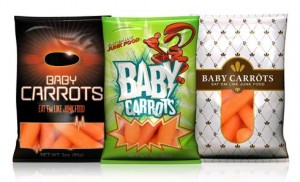Maybe it’s too soon to call the campaign a runaway success, but the respected Middletown, OH Journal is reporting that at least some students at Cincinnati high schools are indeed purchasing baby carrots out of vending machines now that they have been repositioned as junk food.

The campaign was produced by Crispin Porter + Bogusky though I assume without the participation of Alex Bogusky, who pronounced he was sick of advertising and quit earlier this year. It’s not a big media buy, $25M total, so in order to see their edgy commercials you’ll have to hit the right teen programming or just watch them on the web. The most popular seems to be a spot in which a woman fires baby carrots out of a Gatling gun at a guy who is trying to catch them in his mouth.
To me, baby carrots are kind of quease inducing to begin with. They are not actually “babies” at all but mature carrots with minor blemishes which have been tumbled and shaved until they are small and cute. (Thank goodness human babies are not made this way.) And apparently the process makes them last forever since they are typically sold without refrigeration in supermarkets and, I assume, in high school vending machines. Sometimes they get a white powdery coating with age, a kind of patina. But I guess that’s okay, right?
But what’s evil about this is the cynicism of the agency creatives, who seized upon this loophole in the creative brief: we don’t have to make kids eat them, just BUY them from the vending machine. And thus the pro bonos of the healthy school movement are satisfied even though most of the carrots are likely being used as projectiles, bookmarks, doorstops or god forbid this. (A demo of carrot warfare can be found in a fortunately timed V-8 commercial in which two kids are flicking baby carrots at each other across a table in the cafeteria but one of the kids is OK because he’s drinking a V-8… quite possibly containing some of the shavings that were a byproduct of those very baby carrots.)
Changing behavior through an ad campaign is hard, especially when it involves a pliable young audience with a shifting definition of cool. A campaign that did succeed was the “Truth” effort in Florida, aimed at reducing teen smoking by making it cool to attack adults who manipulate kids to smoke. See how many memes are encapsulated just in the description of that campaign? A villain… who may well be your own parent. A superhero… transformed from an ordinary teen. That’s your ad dollars at work.
By contrast, the Baby Carrot people took $25 million that could very well have been used to do something good and spent it on a smirk. Maybe Bogusky quit because he just didn’t want to work with these characters any more. Or maybe he just wanted to go off and be a farmer of great big, foot-long carrots.